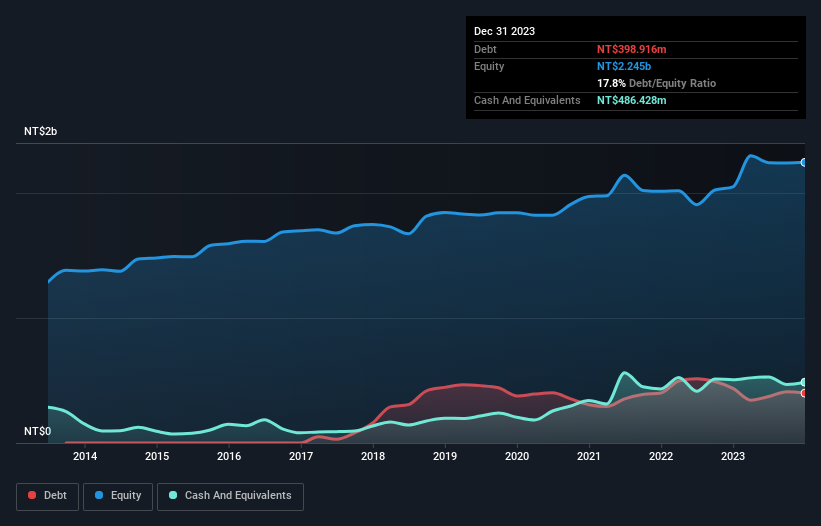Warren Buffett famously said, 'Volatility is far from synonymous with risk.' When we think about how risky a company is, we always like to look at its use of debt, since debt overload can lead to ruin. We can see that Chateau International Development Co., Ltd. (TWSE:2722) does use debt in its business. But the more important question is: how much risk is that debt creating?
When Is Debt A Problem?
Debt is a tool to help businesses grow, but if a business is incapable of paying off its lenders, then it exists at their mercy. Part and parcel of capitalism is the process of 'creative destruction' where failed businesses are mercilessly liquidated by their bankers. However, a more usual (but still expensive) situation is where a company must dilute shareholders at a cheap share price simply to get debt under control. Of course, the upside of debt is that it often represents cheap capital, especially when it replaces dilution in a company with the ability to reinvest at high rates of return. When we think about a company's use of debt, we first look at cash and debt together.
Check out our latest analysis for Chateau International Development
How Much Debt Does Chateau International Development Carry?
You can click the graphic below for the historical numbers, but it shows that Chateau International Development had NT$398.9m of debt in December 2023, down from NT$436.9m, one year before. However, it does have NT$486.4m in cash offsetting this, leading to net cash of NT$87.5m.

How Strong Is Chateau International Development's Balance Sheet?
The latest balance sheet data shows that Chateau International Development had liabilities of NT$436.7m due within a year, and liabilities of NT$374.3m falling due after that. Offsetting this, it had NT$486.4m in cash and NT$11.2m in receivables that were due within 12 months. So its liabilities outweigh the sum of its cash and (near-term) receivables by NT$313.3m.
Given Chateau International Development has a market capitalization of NT$7.39b, it's hard to believe these liabilities pose much threat. However, we do think it is worth keeping an eye on its balance sheet strength, as it may change over time. Despite its noteworthy liabilities, Chateau International Development boasts net cash, so it's fair to say it does not have a heavy debt load!
The modesty of its debt load may become crucial for Chateau International Development if management cannot prevent a repeat of the 57% cut to EBIT over the last year. Falling earnings (if the trend continues) could eventually make even modest debt quite risky. The balance sheet is clearly the area to focus on when you are analysing debt. But it is Chateau International Development's earnings that will influence how the balance sheet holds up in the future. So if you're keen to discover more about its earnings, it might be worth checking out this graph of its long term earnings trend.
But our final consideration is also important, because a company cannot pay debt with paper profits; it needs cold hard cash. Chateau International Development may have net cash on the balance sheet, but it is still interesting to look at how well the business converts its earnings before interest and tax (EBIT) to free cash flow, because that will influence both its need for, and its capacity to manage debt. Over the most recent two years, Chateau International Development recorded free cash flow worth 69% of its EBIT, which is around normal, given free cash flow excludes interest and tax. This free cash flow puts the company in a good position to pay down debt, when appropriate.
Summing Up
While it is always sensible to look at a company's total liabilities, it is very reassuring that Chateau International Development has NT$87.5m in net cash. And it impressed us with free cash flow of -NT$30m, being 69% of its EBIT. So we don't have any problem with Chateau International Development's use of debt. The balance sheet is clearly the area to focus on when you are analysing debt. However, not all investment risk resides within the balance sheet - far from it. Be aware that Chateau International Development is showing 1 warning sign in our investment analysis , you should know about...
If, after all that, you're more interested in a fast growing company with a rock-solid balance sheet, then check out our list of net cash growth stocks without delay.
New: AI Stock Screener & Alerts
Our new AI Stock Screener scans the market every day to uncover opportunities.
• Dividend Powerhouses (3%+ Yield)
• Undervalued Small Caps with Insider Buying
• High growth Tech and AI Companies
Or build your own from over 50 metrics.
Have feedback on this article? Concerned about the content? Get in touch with us directly. Alternatively, email editorial-team (at) simplywallst.com.
This article by Simply Wall St is general in nature. We provide commentary based on historical data and analyst forecasts only using an unbiased methodology and our articles are not intended to be financial advice. It does not constitute a recommendation to buy or sell any stock, and does not take account of your objectives, or your financial situation. We aim to bring you long-term focused analysis driven by fundamental data. Note that our analysis may not factor in the latest price-sensitive company announcements or qualitative material. Simply Wall St has no position in any stocks mentioned.
About TWSE:2722
Chateau International Development
Chateau International Development Co., Ltd.
Adequate balance sheet with very low risk.
Market Insights
Community Narratives




